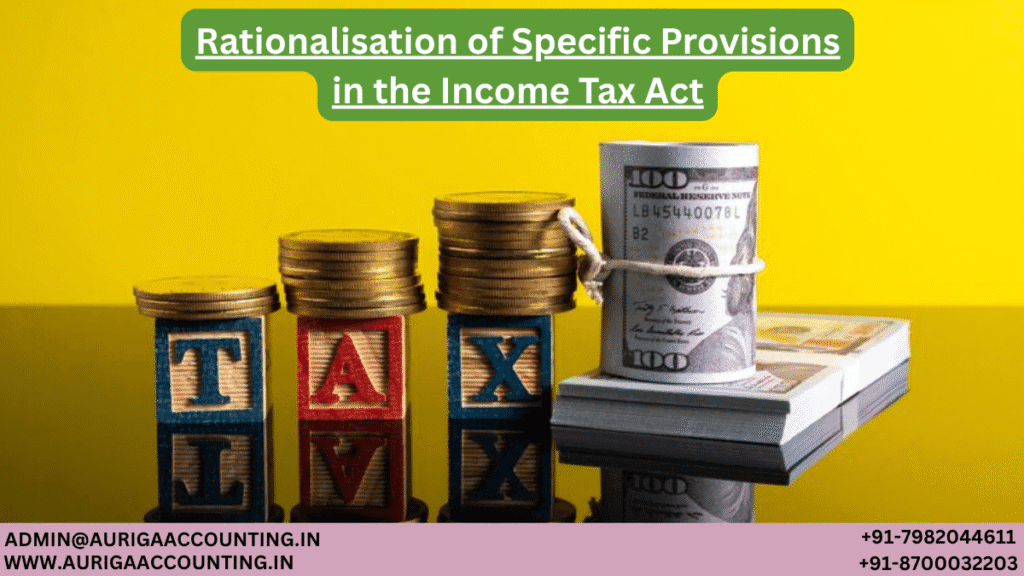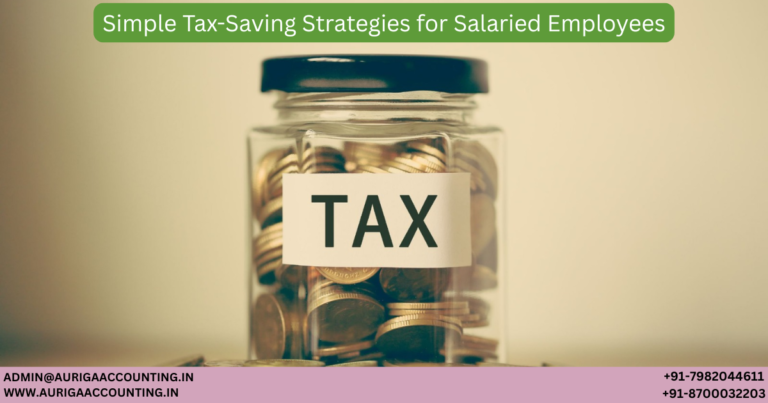Rohan is a Chartered Accountant with 34 years of extensive experience in Finance, Accounting, and Taxation

Rationalisation of Specific Provisions in the Income Tax Act
Introduction
ToggleBudget 2025 introduces a series of significant amendments to the Income Tax Act, aimed at rationalising tax provisions to enhance compliance, reduce litigation, and promote economic growth. Key measures include the streamlining of penalty timelines, clearer guidelines on stay periods in tax proceedings, and the adoption of a block-period methodology for transfer pricing assessments.
To facilitate ease of doing business, the scope of safe harbour rules has been expanded, the process for carrying forward losses in mergers has been simplified, and tax incentives have been extended to inland vessels and entities operating within the International Financial Services Centre (IFSC).
Additional noteworthy reforms include the alignment of Significant Economic Presence (SEP) provisions, revised capital gains tax rates for non-resident taxpayers, and the introduction of tax certainty measures to support the electronics manufacturing sector
Rationalisation of Time Limit for Imposing Penalties
It is proposed to amend Section 275 of the Income Tax Act to streamline the time limit for passing penalty orders under Chapter XXI. As per the proposed amendment, a penalty order must be passed within six months from the end of the quarter in which any of the following events occurs—whichever is applicable:
Completion of the relevant proceedings,
Receipt of the appellate order by the jurisdictional Principal Commissioner or Commissioner,
Passing of the revision order, or
Issuance of the notice for penalty imposition.
A consequential amendment is also proposed in Section 246A to update the reference in line with the revised provisions of Section 275
Clarification on Computation of Time During Court-Imposed Stay
Sections 144BA, 153, 153B, 158BE, 158BFA, 263, 264, and Rule 68B of Schedule II of the Income Tax Act provide that the duration during which proceedings are stayed by a court order or injunction shall be excluded when calculating the time limit for concluding such proceedings.
To eliminate ambiguity, it is proposed to amend these provisions to explicitly state that the excluded period shall begin from the date the stay was granted and shall end on the date the certified copy of the stay vacation order is received by the jurisdictional Principal Commissioner or Commissioner
Enhancing Ease of Doing Business
To simplify transfer pricing compliance and reduce the burden of annual assessments, it is proposed to introduce a scheme for determining the arm’s length price of international transactions for a block period of three years. This approach aligns with international best practices and aims to streamline regulatory processes.
Additionally, to reduce litigation and enhance certainty in international taxation, the scope of safe harbour rules is being expanded to cover a broader range of eligible transactions
Rationalisation of Carry Forward of Losses in Amalgamation Cases
Sections 72A and 72AA of the Income Tax Act govern the carry forward and set-off of accumulated losses and unabsorbed depreciation in cases of amalgamation or business reorganisation.
Currently, these provisions allow the accumulated losses of the amalgamating or predecessor entity to be deemed as losses of the amalgamated or successor entity for the previous year in which the amalgamation or reorganisation takes effect. Separately, Section 72 limits the carry forward of business losses (excluding speculation losses) to eight assessment years following the year in which the loss was originally computed.
To ensure consistency and clarity, it is proposed to amend Sections 72A and 72AA to specify that any loss deemed to be carried forward by the successor entity shall be limited to eight assessment years from the year in which the loss was first computed by the original predecessor entity.
These amendments will apply to any amalgamation or business reorganisation that takes effect on or after 1st April 2025
International Financial Services Centre (IFSC)
To attract and encourage further activities in the IFSC, it is proposed to grant specific tax benefits to ship-leasing units, insurance offices, and treasury centres of global companies established within the IFSC. Additionally, the cut-off date for commencement to claim these benefits has been extended by five years, now up to 31 March 2030
Extension of Tonnage Tax Benefits to Inland Vessels
The tonnage tax scheme under Chapter XII-G, introduced by the Finance Act, 2004, allows eligible shipping companies to opt for a tonnage tax regime as an alternative to the regular corporate tax system, primarily applicable to sea-going vessels.
To promote inland water transport and attract investments in this sector, it is proposed to extend the benefits of the tonnage tax scheme to inland vessels registered under the Inland Vessels Act, 2021. Consequently, inland vessels will be included as “qualified ships” under Section 115VD.
Extension of Time Limit for Passing Orders under Section 115VP
Section 115VP governs the procedure and timeline for opting into the tonnage tax scheme, where qualifying companies apply to the Joint Commissioner. It is proposed to amend sub-section (4) of Section 115VP to mandate that for applications received on or after 1 April 2025, the order approving or rejecting the option must be passed within three months from the end of the quarter in which the application was received
Harmonisation of Significant Economic Presence (SEP) with Business Connection Rules
It is proposed to amend Explanation 2A of Section 9 to clarify that transactions or activities by a non-resident involving the purchase of goods in India solely for export purposes will not constitute Significant Economic Presence. This amendment aligns SEP rules with Explanation 1 to clause (i) of sub-section (1) of Section 9 concerning business connections.
Rationalisation of Capital Gains Tax on Transfers by Non-Residents
Amendments to Section 115AD are proposed to revise the tax rate on long-term capital gains arising from the transfer of securities (excluding units under Section 115AB and gains referred under Section 112A). The new tax rate will be 12.5% instead of 10%.
Tax Certainty for Electronics Manufacturing Schemes
To promote investment in electronics manufacturing, it is proposed to introduce a presumptive taxation regime for non-resident service providers engaged with resident companies that are establishing or operating electronics manufacturing facilities. This measure aims to simplify tax compliance and provide certainty to investors.
About the Author
Rohan
February 23, 2026
new
January 10, 2026
January 8, 2026
January 8, 2026
January 8, 2026
January 7, 2026
January 7, 2026
January 7, 2026
January 7, 2026
January 7, 2026
January 7, 2026
January 7, 2026
January 6, 2026
December 31, 2025
December 31, 2025
December 29, 2025
December 29, 2025
December 27, 2025
December 26, 2025
December 26, 2025
December 12, 2025
December 12, 2025
November 29, 2025
November 29, 2025
November 29, 2025
November 28, 2025
November 28, 2025
November 28, 2025
November 27, 2025
November 27, 2025
November 27, 2025
November 26, 2025
November 26, 2025
November 26, 2025
November 25, 2025
November 25, 2025
November 25, 2025
November 24, 2025
November 24, 2025
November 24, 2025
November 24, 2025
November 21, 2025
November 21, 2025
November 19, 2025
November 19, 2025
November 19, 2025
November 15, 2025
November 15, 2025
November 13, 2025
November 13, 2025
November 13, 2025
June 16, 2025
June 13, 2025
June 11, 2025
June 11, 2025
June 10, 2025
June 9, 2025
June 5, 2025
June 5, 2025
June 5, 2025
June 4, 2025
June 3, 2025
May 31, 2025
May 31, 2025
May 28, 2025
May 28, 2025
May 27, 2025
May 27, 2025
May 27, 2025
May 26, 2025
May 26, 2025
May 26, 2025
May 26, 2025
May 26, 2025
May 24, 2025
May 24, 2025
May 24, 2025
May 24, 2025
May 23, 2025
May 23, 2025
May 23, 2025
May 23, 2025
May 23, 2025
May 23, 2025
May 23, 2025
May 22, 2025
May 22, 2025
May 22, 2025
May 21, 2025
May 21, 2025
May 21, 2025
May 21, 2025
May 21, 2025
May 20, 2025
May 17, 2025
May 17, 2025
May 17, 2025
May 17, 2025
May 16, 2025
May 16, 2025
May 16, 2025
May 15, 2025
May 15, 2025
May 15, 2025
May 14, 2025
May 13, 2025
May 13, 2025
May 13, 2025
May 12, 2025
May 12, 2025
May 12, 2025
May 12, 2025
May 10, 2025
May 10, 2025
May 10, 2025
May 10, 2025
May 9, 2025
May 9, 2025
May 9, 2025
May 9, 2025
May 9, 2025
May 8, 2025
May 8, 2025
May 8, 2025
May 8, 2025
May 8, 2025
May 8, 2025
May 8, 2025
May 7, 2025
May 7, 2025
May 7, 2025
May 7, 2025
May 7, 2025
May 7, 2025
May 6, 2025
May 5, 2025
May 5, 2025
May 5, 2025
May 3, 2025
May 3, 2025
May 3, 2025
May 3, 2025
May 3, 2025
April 30, 2025
April 30, 2025
April 29, 2025
April 28, 2025
April 28, 2025
April 28, 2025
April 28, 2025
April 26, 2025
April 26, 2025
April 26, 2025
April 26, 2025
April 26, 2025
April 25, 2025
April 25, 2025
April 24, 2025
April 23, 2025
October 30, 2023
October 30, 2023
October 30, 2023
October 30, 2023
October 28, 2023
October 28, 2023
October 28, 2023
October 28, 2023
October 28, 2023
October 28, 2023
October 28, 2023
October 28, 2023
October 28, 2023
October 27, 2023
October 27, 2023
October 27, 2023
October 27, 2023
October 27, 2023
October 27, 2023
October 27, 2023
October 27, 2023
October 26, 2023
October 26, 2023
October 26, 2023
October 26, 2023
October 26, 2023
RELATED ARTICLES
Key Reasons...
Simple Tax-Saving...
Tax Saving...
Section 80GGA:...
Guide to Income...
How to Verify...
Handling Income...
No posts found












